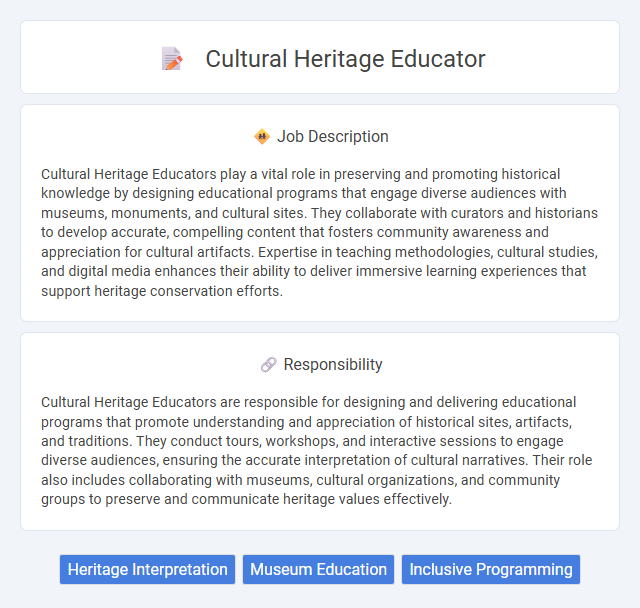
Cultural Heritage Educators play a vital role in preserving and promoting historical knowledge by designing educational programs that engage diverse audiences with museums, monuments, and cultural sites. They collaborate with curators and historians to develop accurate, compelling content that fosters community awareness and appreciation for cultural artifacts. Expertise in teaching methodologies, cultural studies, and digital media enhances their ability to deliver immersive learning experiences that support heritage conservation efforts.
Individuals with a passion for history and strong communication skills are likely suitable for a Cultural Heritage Educator position, as it requires the ability to engage diverse audiences effectively. People who enjoy storytelling and have patience may find this role fulfilling, as it involves explaining complex cultural concepts in relatable ways. Those uncomfortable with public speaking or lacking interest in cultural preservation might find the responsibilities challenging and less suited to their skills.
Qualification
A Cultural Heritage Educator typically requires a bachelor's degree in history, archaeology, anthropology, museum studies, or a related field, often supplemented by a master's degree for advanced roles. Expertise in cultural heritage preservation, public history, and educational methodologies is essential, alongside strong communication and interpretive skills to engage diverse audiences. Proficiency in research, digital tools, and multilingual abilities enhances effectiveness in promoting cultural heritage awareness and education.
Responsibility
Cultural Heritage Educators are responsible for designing and delivering educational programs that promote understanding and appreciation of historical sites, artifacts, and traditions. They conduct tours, workshops, and interactive sessions to engage diverse audiences, ensuring the accurate interpretation of cultural narratives. Their role also includes collaborating with museums, cultural organizations, and community groups to preserve and communicate heritage values effectively.
Benefit
Working as a Cultural Heritage Educator likely offers the benefit of fostering a deep connection with history and diverse cultures while enhancing communication and teaching skills. This role probably provides opportunities to engage with communities and promote cultural awareness, which can lead to a rewarding sense of contribution and personal growth. Career advancement in education, museum work, or public history fields may also be a potential outcome.
Challenge
The Cultural Heritage Educator job likely involves the challenge of engaging diverse audiences with varying levels of prior knowledge and interest in heritage topics. It may require adapting educational content to balance historical accuracy while making it accessible and relevant to contemporary learners. Managing limited resources and navigating sensitive cultural contexts could also present significant hurdles in effectively delivering the educational programs.
Career Advancement
Cultural Heritage Educators gain specialized knowledge in history, art, and anthropology, positioning themselves as key experts in museums, historical sites, and educational institutions. Career advancement opportunities include roles such as program coordinator, curator, or cultural resource manager, with increased responsibilities in project development and community engagement. Mastery in digital interpretation tools and grant writing significantly enhances prospects for leadership positions within the cultural heritage sector.
Key Terms
Heritage Interpretation
Heritage interpretation specialists design engaging programs to communicate the historical and cultural significance of sites, artifacts, and traditions. They employ storytelling techniques, multimedia tools, and interactive exhibits to foster public understanding and appreciation of cultural heritage. Their work supports conservation efforts by connecting visitors emotionally to heritage, promoting sustainable preservation.
Museum Education
A Cultural Heritage Educator specializing in Museum Education develops and implements engaging programs that connect diverse audiences with historical artifacts and cultural narratives. They utilize interpretative strategies and interactive technologies to enhance visitors' understanding and appreciation of museum collections. Their role supports lifelong learning by fostering critical thinking and cultural awareness through educational workshops, guided tours, and multimedia presentations.
Inclusive Programming
Cultural Heritage Educators develop inclusive programming to engage diverse audiences by incorporating multiple cultural perspectives and accessible learning materials. These programs promote equitable participation, ensuring individuals of all backgrounds, abilities, and ages connect with heritage content meaningfully. By utilizing adaptive teaching strategies and community collaboration, they foster deeper understanding and appreciation of cultural histories.
 kuljobs.com
kuljobs.com